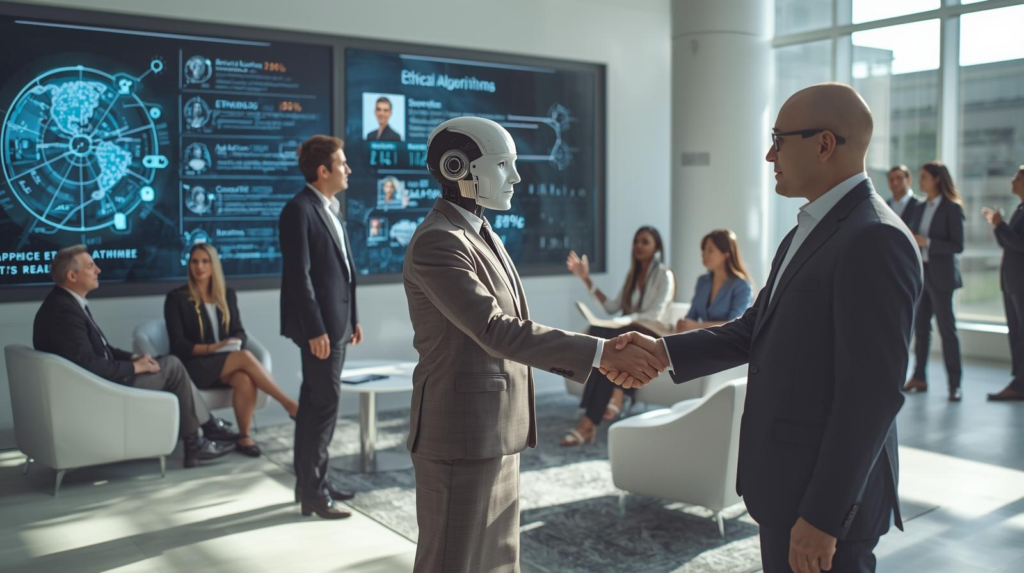
Artificial Intelligence has transformed industries worldwide, and recruitment is no exception. From automating resume screening to conducting preliminary interviews, AI is reshaping how organizations identify, evaluate, and hire talent. However, as the adoption of AI-driven systems accelerates, the ethics of AI in hiring have become one of the most debated topics in business and HR circles. Supporters argue that AI makes recruitment more efficient, consistent, and unbiased. Critics, on the other hand, caution that biased algorithms, privacy risks, and the absence of human empathy could worsen existing problems rather than solve them. At AixCircle, we believe that understanding both the strengths and limitations of AI in recruitment is essential for organizations aiming to build a fair, transparent, and future-ready workforce.
Understanding the Ethics of AI in Hiring
Before diving into the AI hiring pros and cons, it’s important to define what “ethical AI hiring” means. At its core, it refers to the responsible and transparent use of AI-driven tools that support recruitment processes while ensuring fairness, privacy, and accountability. Ethical concerns typically emerge when algorithms are trained on biased data, when candidate information is misused, or when human oversight is removed from critical decision-making steps. In this context, the ethics of AI in hiring serve as a guiding principle to balance automation with fairness.
Recruitment has traditionally been fraught with bias — from unconscious preferences for certain schools to gender and racial discrimination. AI, when designed properly, has the potential to minimize these issues. But if left unchecked, it can unintentionally replicate and amplify the same patterns of bias found in historical data. This tension highlights why organizations must weigh the AI hiring pros and cons carefully and adopt practices that uphold ethical AI hiring.
The Pros of AI in Recruitment
1. Faster Resume Screening and Candidate Shortlisting
One of the most significant advantages of AI in recruitment is speed. Large organizations often receive thousands of resumes for a single opening, overwhelming HR teams. AI-powered applicant tracking systems (ATS) can filter resumes within minutes, scanning for skills, experience, and keywords that match job descriptions. This not only reduces the time-to-hire but also allows recruiters to focus on higher-value tasks such as engaging with top candidates.
In terms of the ethics of AI in hiring, this efficiency benefits candidates as well. Long waiting times are reduced, applications are not lost in backlogs, and qualified applicants have a better chance of being noticed. Companies like AixCircle recognize that AI-assisted shortlisting enhances the candidate experience while ensuring that human recruiters spend more time on meaningful interactions.
2. Objective Skill-Based Analysis
Human judgment is naturally subjective. Recruiters may favor candidates who share similar backgrounds, communication styles, or cultural references. AI, however, evaluates candidates on predefined metrics such as skills, qualifications, and test scores. This makes ethical AI hiring a powerful tool to reduce human bias in the early stages of recruitment.
When implemented correctly, AI hiring practices can open doors for candidates who might otherwise be overlooked due to unconscious bias. For instance, rather than filtering out candidates because of the university they attended, AI tools can focus on skills demonstrated through work portfolios or online certifications. This aligns with the ethics of AI in hiring, ensuring a merit-based selection process.
3. Enhanced Candidate Engagement Through AI Chatbots
The hiring process can be stressful for applicants, particularly when communication is slow. AI-driven chatbots are transforming candidate engagement by providing real-time answers to queries, scheduling interviews, and offering updates about application status. For organizations, this reduces administrative workloads; for candidates, it fosters transparency and responsiveness.
This advancement reflects the AI hiring pros and cons debate, where efficiency and personalization must be balanced. While some argue that chatbots lack the warmth of human interaction, their 24/7 availability and accuracy are undeniable assets. Companies like AixCircle view AI chatbots as an ethical hiring practice when they complement — rather than replace — genuine human conversations.
4. Consistency in Evaluation and Fairness
Another key advantage of AI recruitment ethics is consistency. Unlike humans, AI systems don’t get tired, distracted, or influenced by external factors during candidate evaluation. This means every applicant is judged by the same standards, ensuring fairness across the board.
When organizations implement ethical AI hiring, they remove many of the discrepancies that creep into traditional recruitment. For example, two equally qualified candidates are less likely to receive different evaluations simply because one interviewer was in a better mood that day. This alignment with the ethics of AI in hiring makes technology a powerful equalizer in talent acquisition.
The Cons of AI in Recruitment
1. Algorithmic Bias and Discrimination
While AI is often celebrated for its ability to reduce human bias, it can also amplify discrimination if trained on flawed data. Historical hiring records may include biases against gender, race, or socioeconomic background. When these records are used to train AI models, the algorithms can perpetuate the same discriminatory patterns.
This presents a major challenge in the ethics of AI in hiring conversation. Ethical AI hiring requires organizations to audit their algorithms continuously, ensuring that recruitment systems do not unintentionally exclude qualified candidates. At AixCircle, we emphasize that transparency and accountability are key components of fair AI hiring practices.
2. Loss of the Human Touch
Recruitment isn’t just about skills and qualifications — it’s also about cultural fit, empathy, and interpersonal connections. Over-reliance on automation risks stripping the process of its “human touch.” Candidates may feel alienated if they interact solely with AI systems and never receive personalized feedback from human recruiters.
This concern is central to the AI hiring pros and cons debate. While AI boosts efficiency, ethical AI hiring requires maintaining human involvement in decision-making. Organizations must remember that recruitment is a human-centered activity, and technology should support — not replace — genuine human connections.
3. Privacy Concerns and Data Security
AI recruitment practices often involve collecting vast amounts of personal data, from resumes to psychometric assessments. While this data enables accurate evaluations, it also raises privacy and security concerns. Candidates may worry about how their information is stored, who has access to it, and whether it will be used for unintended purposes.
The ethics of AI in hiring demand strict data governance policies. Employers must communicate clearly with candidates about data usage and implement robust cybersecurity measures. Ethical AI hiring ensures that personal data is treated with respect, maintaining trust between organizations and applicants.
4. Risk of Over-Reliance on Automation
Another drawback lies in the temptation to rely too heavily on AI. Recruitment leaders may become dependent on algorithmic recommendations, sidelining their own judgment. This could result in overlooking candidates who demonstrate potential beyond what AI metrics capture.
Within the AI hiring pros and cons framework, this over-reliance highlights the need for balance. AI recruitment ethics encourage organizations to view AI tools as assistants rather than decision-makers. At AixCircle, we advocate a hybrid approach where technology accelerates processes but final decisions remain human-led.
Striking the Balance: Building Ethical AI Hiring Practices
The future of AI in recruitment depends on how effectively organizations address ethical challenges while maximizing benefits. The ethics of AI in hiring should guide every step — from designing unbiased algorithms to maintaining transparency with candidates. By combining automation with human oversight, companies can create recruitment systems that are fast, fair, and reliable.
Some strategies include:
- Regularly auditing AI models for bias.
- Ensuring diversity in training data.
- Using AI tools as supportive, not replacement, systems.
- Prioritizing candidate privacy and clear communication.
When companies follow these practices, they uphold ethical AI hiring while reaping the rewards of efficiency and objectivity. The AI hiring pros and cons debate will continue, but organizations that embrace responsible AI recruitment ethics will stand out as leaders in fairness and innovation.
Conclusion: The Future of AI Hiring with AixCircle
As organizations embrace the digital future, the role of AI in recruitment will only expand. Yet, the ethics of AI in hiring will remain the cornerstone of successful and sustainable hiring strategies. From faster resume screening to enhanced engagement, the pros are undeniable. But from algorithmic bias to privacy risks, the cons demand careful attention.
At AixCircle, we believe that the conversation isn’t about whether to use AI in recruitment, but about how to use it responsibly. By prioritizing ethical AI hiring practices, businesses can build diverse, inclusive, and future-ready teams. The debate around AI hiring pros and cons will evolve, but one fact is clear: the future of recruitment lies in balancing human empathy with technological precision.

